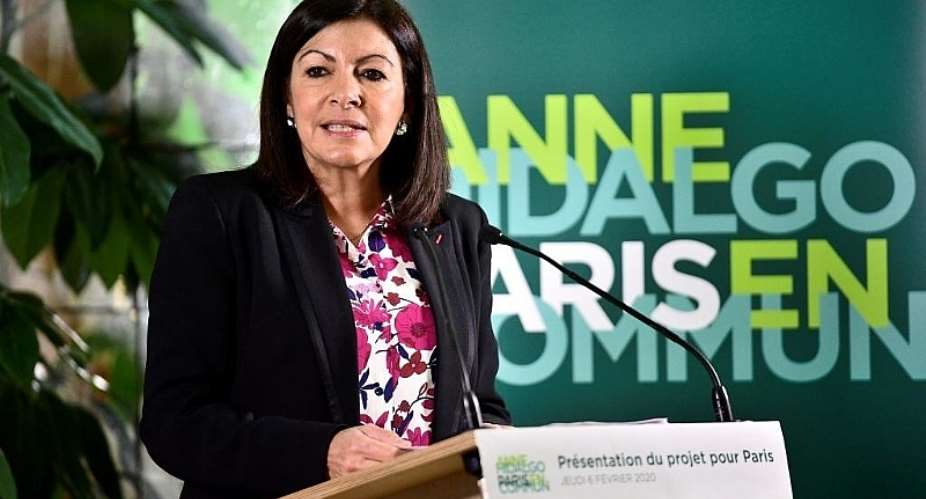France is to hold its Covid-delayed second round of local elections on 28 June and Paris Mayor Anne Hidalgo has placed green issues at the forefront of her vision for the city in the hope of re-election.
After taking the largest share of votes in the first round of the elections on 15 March, just days before the second round was cancelled due to nationwide confinement to stop the spread of the coronavirus, Anne Hidalgo of the French Socialist Party is the favourite to win the 28 June vote.
Who is she?
Hidalgo was born to a Spanish Republican family in Cadiz, Spain, in 1959 and immigrated with her parents to the French city of Lyon in 1961. She grew up speaking Spanish at home and French in school and acquired French citizenship at the age of 14.
After studies in social law in Lyon and trade unionism at Nanterre University west of Paris, she joined the civil service as a labour inspector in 1984. She joined the Socialist Party in 1994 and served as first deputy mayor of Paris under her predecessor, Bertrand Delanoë.
Hidalgo became the first woman mayor of Paris in 2014 and largely continued Delanoë's efforts to make the city more environmentally friendly, building bike lanes, reducing vehicle traffic to combat air pollution and expanding the city's recycling programme.
She has faced difficulties with volatile bicycle and car sharing programmes Vélib and Autolib, complaints about litter and challenges with affordable housing, notably in battles with seasonal renting platform Airbnb.
What would she do if re-elected?
Hidalgo has placed environmental issues at the core of her campaign for a second six-year mandate, with promises that include planting trees and expanding green space, having bike lanes on every street by 2024 and reducing plastic and other waste.
She has promised to boost the supply of public housing units, to fight the high cost of living and to invest one billion euros per year in keeping the city clean.
While unpopular with drivers in the city and the surrounding suburbs, Hidalgo is expected to continue closing major roads in efforts to reduce vehicle traffic.
The coronavirus epidemic has been favourable to Hidalgo's long-term efforts to make public spaces friendlier places for pedestrians and cyclists.
Citing the interest of public health, Hidalgo's administration has closed some roads and parking spaces to make more space for bike lanes and pedestrians.
Hidalgo has also put her approach to public space at the heart of economic recovery for bars, cafés and restaurants, allowing terraces to expand on to sidewalks and some streets.
Will she win?
Simple math would suggest Hidalgo stands a very good chance of re-election.
During the first round Hidalgo was in front with 29.3 percent of the vote, well ahead of Rachida Dati of right-wing Les Républicains with 22.7 percent and Agnès Buzyn of President Emmanuel Macron's Republic on the Move party with 17.3 percent.
Hidalgo also took the largest share of the vote in nine of the capital's 17 voting districts, which correspond to the city's 20 arrondissements, with arrondissements one through four grouped together.
The incumbent has reached a deal to merge lists with David Belliard, candiate of the Green party EELV, whose campaign took 10.8 percent of the first-round vote.
Hidalgo and Belliard appeared together at a Paris café when the capital's bars and restaurants reopened their terraces on 2 June, with the incumbent suggesting EELV candidates would probably become deputy mayors or mayors of arrondissements.
Dati and Buzyn are still running separate lists.





 Meta releases new version of conversational AI across its platforms
Meta releases new version of conversational AI across its platforms
 Cape Town named Africa’s Best Airport 2024 by Skytrax
Cape Town named Africa’s Best Airport 2024 by Skytrax
 Bono East: Four injured after hearse transporting corpse crashes into a truck
Bono East: Four injured after hearse transporting corpse crashes into a truck
 ‘Be courageous, find your voice to defend our democracy’ — Sam Jonah urges journ...
‘Be courageous, find your voice to defend our democracy’ — Sam Jonah urges journ...
 Exodus of doctors, nurses and teachers have worsened because of unserious Akufo-...
Exodus of doctors, nurses and teachers have worsened because of unserious Akufo-...
 2024 election: Avoid insults, cutting down people in search of power – National ...
2024 election: Avoid insults, cutting down people in search of power – National ...
 ‘You passed through the back door but congratulations’ — Atubiga on Prof Jane Na...
‘You passed through the back door but congratulations’ — Atubiga on Prof Jane Na...
 Government’s $21.1 billion added to the stock of public debt has been spent judi...
Government’s $21.1 billion added to the stock of public debt has been spent judi...
 Akufo-Addo will soon relocate Mahama’s Ridge Hospital to Kumasi for recommission...
Akufo-Addo will soon relocate Mahama’s Ridge Hospital to Kumasi for recommission...
 We must not compromise on our defence of national interest; this is the time to ...
We must not compromise on our defence of national interest; this is the time to ...
